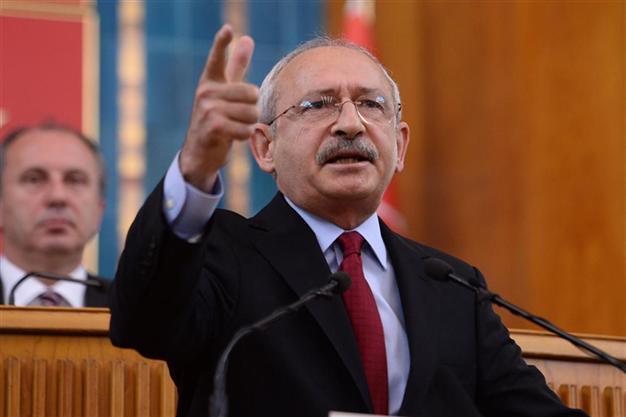Turkish ruling party AKP’s assembly maneuver for Kurdish bid hits snag
ANKARA

CHP leader said the proposal “pushed Parliament toward unlawfulness.” DAILY NEWS photo
The ruling party’s efforts to solve the Kurdish issue through the creation of a parliamentary investigation commission have again split Turkey’s Parliament into two warring camps, with the main opposition and the main nationalist party questioning the panel’s very legitimacy.
Parliament approved a proposal from the Justice and Development Party (AKP) on April 9 to establish a “Resolution Process Assessment Commission,” with the votes of the Peace and Democracy Party (BDP) in addition to those of the AKP, but deputies from the main opposition Republican People’s Party (CHP) and the Nationalist Movement Party (MHP) left the General Assembly meeting just before the vote in protest.
“The proposal accepted in Parliament yesterday [April 9] is not our proposal,” Kılıçdaroğlu told reporters following a meeting with President Muharrem Yılmaz and administrative board members of the Turkish Industrialists’ and Businessmen’s Association (TÜSİAD).
“We know that the investigation proposal introduced by the AKP is not one that is permitted by the Constitution and [Parliament’s] internal regulations. We believe Parliament is being pushed to a different position – to unlawfulness,” he said.
Prime Minister Recep Tayyip Erdoğan directed severe criticism at the CHP following uproar in the General Assembly that stopped just short of fisticuffs.
“Attacking the presidential board [at the Parliament], occupying the rostrum. … They resorted to such a way. Surely, this reveals the real identity of the CHP,” Erdoğan said.
Parliamentary Speaker Cemil Çiçek said in Ankara that the CHP and the MHP’s decision not to join the commission was at “their own discretion.” He said, “I cannot make a decision on behalf of any [political party] group by replacing them.”
According to procedure, investigation commissions function temporarily for four months with the four political parties present in Parliament represented on the commission according to the proportionate number of seats they hold in the legislature. Since the CHP and the MHP have declared that they will not assign members, the commission will be composed of deputies from the ruling AKP and the BDP, with the former likely set to possess 10 seats and the latter one seat. If the CHP and the MHP assign deputies, the panel would have 17 members.
